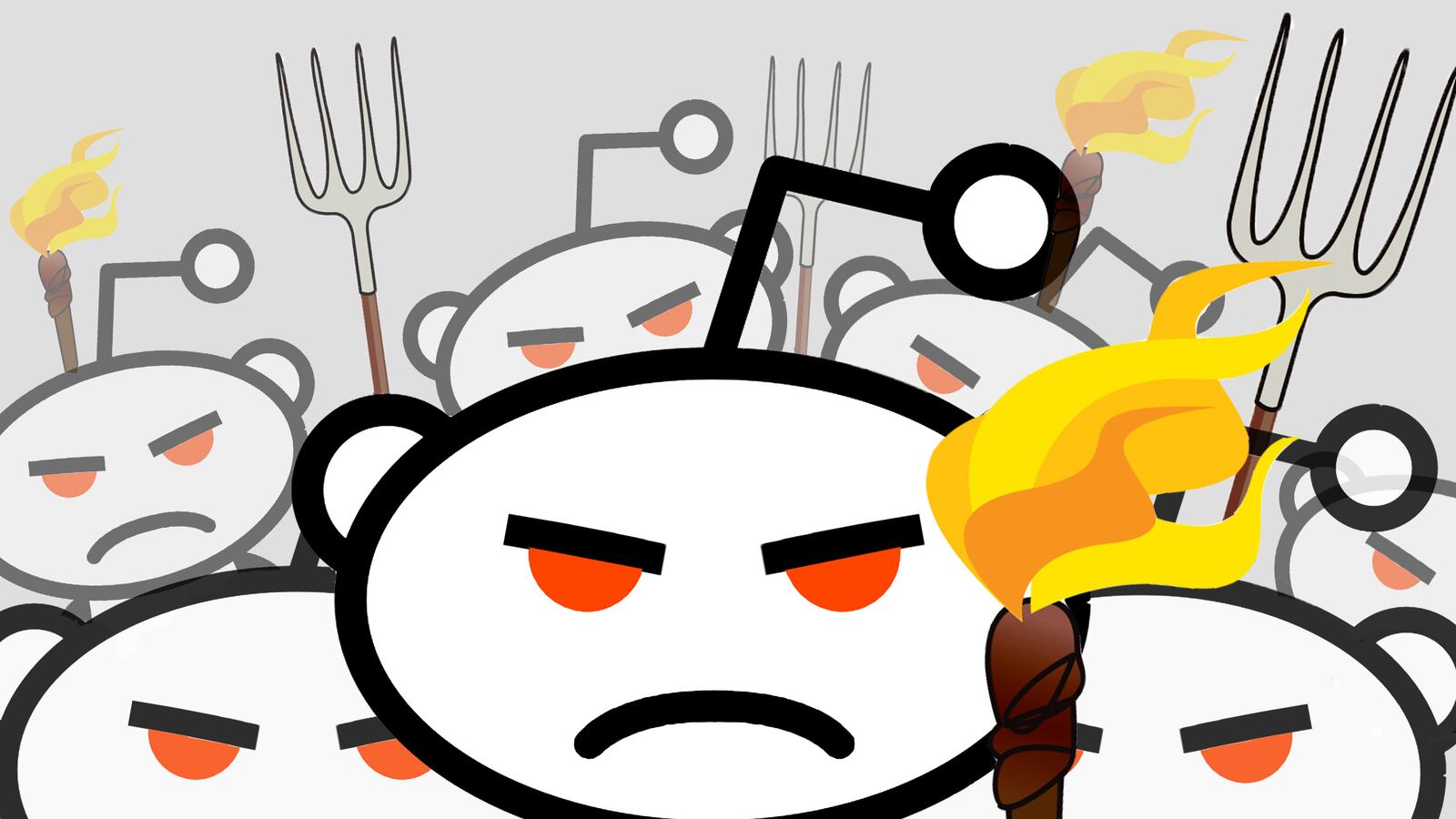On Wednesday, the Internet community site Reddit shut down a burgeoning group with the common, explicit goal of hating fat people.
The section, called /r/FatPeopleHate, consisted mostly of screenshots of subscribers’ overweight Facebook friends, their names blurred out but their faces visible, often lamenting that they couldn’t lose weight.
The value added to the world by this community was, of course, nonexistent. Two of the subreddit’s five rules, after all, were “no dissent/no being fat” and “absolutely NO FAT SYMPATHY.”
But by 2 p.m. on Thursday, one day after the company announced the changes, 15 of the top 25 posts on all of Reddit either poked fun at overweight people, served as backhanded PSAs for the side effects of obesity—like a picture of the extracted heart of an obese person—or called for Ellen Pao, Reddit’s CEO, to step down.
The 24th most popular post on the entire site was called “Found Ellen Pao’s Family Crest.” The post linked to a picture of a swastika.

Reddit, remember, is the 10th most visited website in the United States and 30th in the world. This is not a blip or a trend. This is what the Internet is. The web is an economy of its own that now runs on collective shaming and fear under the fake auspices of free speech, self-expression, and the collective good.
But why?
Jon Ronson released a book this year called So You’ve Been Publicly Shamed about the misappropriation of justice in the Internet age. It is filled with stories of middle class people who made minor mistakes on the web—mistimed jokes, or simply banal, out-of-context sentences said in the presence of people with a working iPhone camera—who were shamed out of jobs and had their lives upended overnight.
“I’ve written for 30 years and I’ve never been significantly criticized when I talk about abuses of power. This book was the first time I say that the people abusing their power are us, and I got this ferocious backlash,” Ronson tells The Daily Beast. “We love to find fault in other people. But we can’t handle thinking about our own faults, even if we know in our hearts we are wrong.”
Most of these cases, Ronson says, came from a misguided view of justice—a way for Twitter users or comment section regulars to feel better about themselves through the belittling of someone who has said or done something that sounded like it was inhibiting the freedom of those around them.
More freedom, in this case, is as easy as a retweet or a comment. Justice served.
Problem is, the whole story is almost never able to fit in a picture or a Tweet, and lives are ruined anyway.
In the book, for example, the pseudonymous “Hank” essentially makes a “that’s what she said” joke at a conference for software developers. A woman sitting behind Hank took offense and posted his picture, along with the joke, on Twitter. Hank, who has two kids and a wife, was fired when he returned to work. Later, feeling pressure from those defending Hank, the employer of the woman who posted the photo let her go, too.
There was nothing remotely good gained from it.
As for those who are unrepentantly out to shame their fat Facebook friends? They are claiming the same moral high ground. In posts deriding Pao, users claim this ban treads on their free speech. And, in some cases, some of the over 149,000 subscribers think they are trying to help with the obesity epidemic.
The subreddit’s permanent sidebar, which served as its unofficial bylaws, called the body acceptance movement “delusional.” By the community’s logic, this site could help overweight and obese people—69 percent of America’s population, according to the CDC—see themselves as members of FatPeopleHate do. To some of the group’s subscribers, this was a public service.
But in several studies collected over the last decade, overweight people who faced discrimination based on their appearance were instead twice as likely to gain weight and become obese over the course of the study.
Even if one were to entertain the idea that the goal of a “community” dedicated to hating fat people is to get people to lose weight through an exponential, public guilt trip—this would be a flawed idea. The idea that this abuse was done for any overarching social good has been scientifically proven to be consistently ineffective.
Public shaming as a deterrent does not work. It does not make positive change. It does not magically create more “freedom” for others.
Public shaming is, however, an effective means of ruining the lives of singled-out individuals.
But the web runs on it anyway.
This is not, as Ronson points out, a political construct. The web runs on a currency of shame regardless of your political party.
“It happens on the left. Then on the libertarian right—those who are, in theory, diametrically opposed to social justice—people also get outraged, but they don’t call it that. It’s on both sides of the fence,” says Ronson. “The hardest, coldest, most extreme people are winning.”
Ronson thinks it detracts from real social justice—issues of systemic, abject corruption and abuses of power—that is happening because of policy and power structures, not bystanders.
“This is not social justice. This is a cathartic alternative to social justice,” he says. “It’s become this amorphous way to destroy anybody that we don’t like.”
Especially after this week, John Green feels the same way.
Green is the author of the young adult novel The Fault In Our Stars, which temporarily took over teen culture last summer when it was made into a beloved movie. He gained much of his notoriety for being active on the social network Tumblr and for video blogs on YouTube before his book’s ubiquity on teen bookshelves.
And this week, for no discernible reason and with no proof, a collection of Tumblr users large enough to get his attention accused him of pedophilia.
“i (sic) bet john green thinks people don’t like him because he’s a ‘dork’ or a nerd or whatever,” one user wrote. “when in reality it’s because he’s a creep who panders to teenage girls so that he can amass some weird cult-like following. and it’s always girls who feel misunderstood, you know, and he goes out of his way to make them feel important and desirable. which is fucking? weird?”
Another user piled on.
“Lets get this enough notes so he has to address it and try to defend himself.”
So Green did just that.
“You want me to defend myself against the implication that I sexually abuse children? Okay. I do not sexually abuse children,” he wrote. “I’m tired of seeing the language of social justice—important language doing important work—misused as a way to dehumanize others and treat them hatefully.”
Green then said he was going to be less active on the Internet now, that “the outrage cycle is exhausting,” that he “needs some distance for his well-being.”
“Too often the Internet moves from jolt to jolt, from hatred to hatred, ever more convinced of our own righteousness and the world’s evil,” he wrote. “And getting caught up in that is very painful.”
Basically, now that the power is with those who say the loudest and most incendiary thing, the Internet is no longer worth it for people like John Green. Now that shame is the currency of the web, the only people with anything to lose are those who dare to do anything at all.
Here’s the good news: Ronson thinks it’s fixable. He doesn’t think this is who we are as people, anyway.
He sees people at the dog park. Neither the people nor the dogs at the dog park immediately sling mud or hurl career-ending accusations at him. They actually appear to be pretty nice.
“I hope that’s not what we’re finding out: that we are the terrible people we view on the Internet,” he says. “Surely, people’s appetite for destruction can’t carry on.”
So what’s the fix? Reflection.
The web’s problems stem from a basic human idea: No one wants to revisit the sins of their past. No one wants to rethink the time they were once, even if temporarily, the bully in school, or the accidentally bad friend. No one wants to say they were a part of the mob.
But with the Internet, no one has to. And when it was just a comment or a “like” on Facebook, were you ever really part of the mob anyway?
“I think people know in their hearts that people like Hank were wronged. But admitting that afterwards—it makes us look bad,” says Ronson. “There’s a huge amount of cognitive dissonance going on. It’s like illogical thinking. The web is bringing out the weird, illogical ways we justify our own poor behavior.”
And, as Ronson points out, if we don’t start thinking about our own behavior on the Web soon—and maybe educating our kids about it—there’s always a backup plan.
“A couple of years ago, [someone] said to me, ‘People are gonna flee the Internet like they’re in a John Carpenter movie.’ I said, ‘Don’t be ridiculous!’” Ronson recalls. “But I sort of feel that way myself now.”






